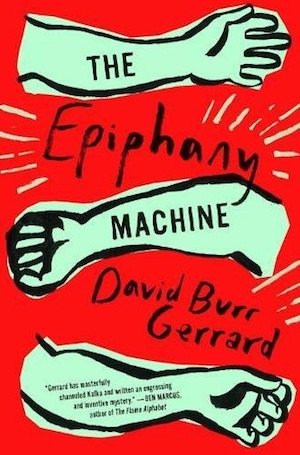
After the initial list and testimonial, the book jumps into a narrative from the perspective of Venter, a young man whose parents have used the epiphany machine with troubling results. They both received epiphanies on their arms that hung over them like curses, and his mother’s absence is either a result of the tattoo or of the tattoo’s prophetic nature. The tattoos the machine deliver are always difficult for the recipients to handle, phrases like “Should not be a father” or “Dependent on the opinion of others” are some examples. The two Venter’s parents received were neither becoming nor well received.
Finding his mother becomes is the mystery that drives the book’s beginning. Venter seeks out the machine and eventually meets Adam Lyons, its kooky stoner owner. Of course, Venter ventures down the rabbit hole and gets a tattoo himself which is not complimentary, and after this the story shifts to the relationship between Venter, his tattoo and the machine’s owner.
This is a well-written contemporary novel but there’s not much for crime fiction fans here and it tends to meander. The New York City created by the author is a slightly modified New York to account for the magical realism in the story and it is really unextraordinary. There are endless interruptions in the form of testimonials and documents which eventually crowd out the narrative.
We hear of celebrities and notable people who have interacted with the machine, there is even a semi-subplot concerning John Lennon and his murderer Mark David Chapman. But after the initial interest piqued by the machine, as this otherworldly fictional creation grows its grip wears off. Eventually, 9/11 happens and the second half of the book centres around a possible connection between the machine and one of the terrorists responsible. The ethics of the machine and the rules and practices Lyons employs using it come into question.
The book continuously and aimlessly wanders and as it pushes along, nothing feels that fresh or new outside of the initial conceit. David Burr Gerrard is trying too many things here and falls into a strange literary limbo straddling the contemporary literary genres of writers like Michael Chabon, Jonathan Lethem and John Irving, along with a science fiction-like element and a mystery. But the resemblance to those other writers as well as the lack of clear genre and narrative drive make for a slow, jumbled, uneven and eventually tiresome read.
In the end, The Epiphany Machine is a good idea gone awry. A book that tries too hard to be deep, a book reaching to deliver an epiphany to its reader that never does. The personal narrative is at times compelling and Burr Gerrard is a good writer, but to get the goods from his latest is a lot of work.
GP Putnam’s Sons
Print/Kindle
£11.99
CFL Rating: 2 Stars